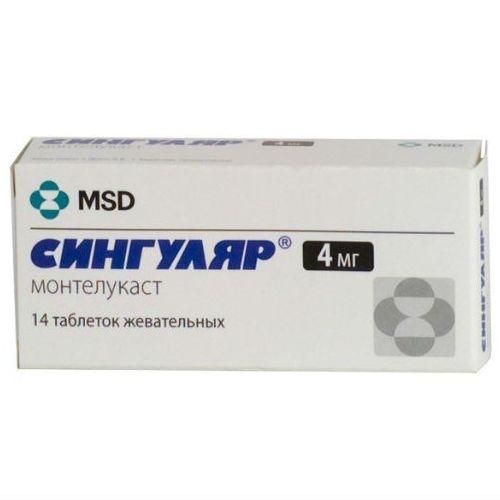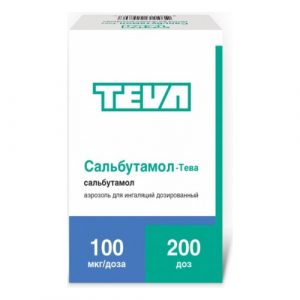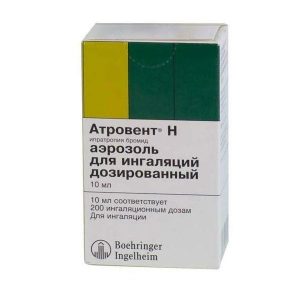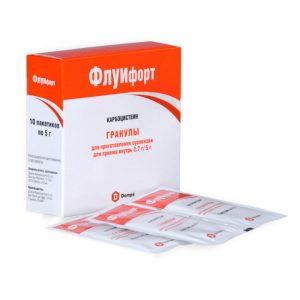Description
Release form
Chewable tablets.
Packing
14 pcs.
Pharmacological action
Singular is an antagonist of leukotriene receptors. Montelukast inhibits the cysteinyl of leukotriene receptors of the epithelium of the respiratory tract, while showing the ability to inhibit bronchospasm, due to inhalation of cysteinyl-leukotriene LTD4 in patients with bronchial asthma. A dose of 5 mg is sufficient to relieve bronchospasm induced by LTD4. The use of montelukast in doses exceeding 10 mg / day 1 time / day does not increase the effectiveness of the drug. Montelukast causes bronchodilation within 2 hours after ingestion and may supplement bronchodilation caused by beta2-adrenergic agonists.
Indications
Prevention and long-term treatment of bronchial asthma in adults and children, from 2 years of age, control of day and night symptoms of the disease.
Relief of symptoms of allergic rhinitis (seasonal and year-round) in children from 2 years of age.
Contraindications
Hypersensitivity to the components of the drug.
Precautions: Pregnancy, lactation period.
Use during pregnancy and lactation
The singular should be used during pregnancy and lactation only when the expected benefits to the mother outweigh the potential risk to the fetus or baby.
Special instructions
The singular is not recommended for the treatment of acute asthma attacks. In acute asthma, patients should be prescribed medications for relief and preventive therapy. Patients with bronchial asthma are always advised to carry emergency medications (short-acting inhaled beta-agonists). To stop an acute attack of bronchial asthma after exercise, use a drug to stop the attack, i.e., an inhaled short-acting beta-agonist. Treatment with a Singular does not guarantee absolute prevention of exacerbations. In the period of exacerbation of asthma and the need to use emergency drugs (short-acting inhaled beta-agonists) to stop attacks, you should not stop taking Singular. Patients with a confirmed allergy to acetylsalicylic acid and other non-steroidal anti-inflammatory drugs should avoid contact with these drugs during the treatment with Singular, since C ngulyar, improving respiratory function in patients with allergic bronchial asthma, nevertheless, does not prevent bronchoconstriction caused by them. The dose of inhaled glucocorticosteroids used simultaneously with the Singular is gradually reduced under the supervision of a doctor. A sharp replacement of inhaled or oral glucocorticosteroids with a Singular is unacceptable. In rare cases, a decrease in the dose of systemic glucocorticosteroids in patients receiving simultaneously anti-asthma drugs, including leukotriene receptor blockers, was accompanied by the appearance of one or more of the following complications: eosinophilia, hemorrhagic rash, worsening pulmonary symptoms, cardiological complications and / or neuropathy, sometimes diagnosed as Charge-Strauss syndrome (systemic eosinophilic vasculitis). Although a causal relationship between these side effects and treatment with leukotriene receptor antagonists has not been established, caution should be exercised when lowering the dose of systemic glucocorticosteroids during treatment with Singular, as well as ensure appropriate monitoring of the patient. Patients with phenylketonuria should be informed that the Singular contains 1.2 mg of aspartame in one chewable tablet. No age-related differences in the profile of the effectiveness and safety of the Singular were revealed.
For patients with mild or moderate hepatic impairment, special dose selection is not required. There is no data on the nature of the pharmacokinetics of montelukast in patients with severe hepatic insufficiency (more than 9 points on the Child-Pugh scale).
For patients with renal failure, a special dose adjustment is not required.
Influence on the ability to drive vehicles and work with mechanisms: there are no facts indicating that taking Singular affects the ability to drive a car or moving mechanisms.
Composition
1 tablet contains:
Active ingredient: Montelukast 4 mg.
Excipients:
Mannitol
Microcrystalline cellulose
Hyprolose
Iron oxide red
Sodium croscarmellose
Cherry flavoring
Aspartame
Magnesium stearate.
Dosage and administration of
The drug is taken orally 1 time / day, regardless of food intake.
For bronchial asthma – 1 tablet at night.
For bronchial asthma and allergic rhinitis – 1 tablet at night.
In case of allergic rhinitis – 1 tablet per day in an individual regimen, depending on the time of the greatest exacerbation of symptoms.
The singular is prescribed for children aged 2 to 5 years: at a dose of 4 mg (1 tablet chewing) per day. The therapeutic effect of the Singular with a change in the course of bronchial asthma develops during the day.
For elderly patients, patients with renal insufficiency, patients with mild or moderate impaired liver function, as well as gender-specific special dose selection is not required.
Side effects
In general, the Singular is well tolerated. Side effects are usually mild and, as a rule, do not require discontinuation of the drug. The overall incidence of side effects during treatment with Singular is comparable to their frequency with placebo treatment.
Children aged 2 to 5 years with bronchial asthma: 573 children took part in the clinical studies of Singular in the age group from 2 to 5 years. According to a 12-week placebo-controlled study in the singular treatment group, the only observed side effect occurring with a frequency of more than 1% compared with placebo was thirst. The difference between the two treatment groups was not statistically significant. With a longer follow-up (12 months or more), the profile of side effects did not change.
Children from 2 to 14 years old with seasonal allergic rhinitis: 280 children took part in the clinical studies of Singular in the age group from 2 to 14 years old. The safety profile of the drug in children was generally similar to the safety profile in adults and comparable to the safety profile of placebo. According to a 2-week placebo-controlled study in the treatment group, no side effects were found with a frequency of more than 1% compared with placebo in patients.
During the post-marketing use of the drug, the received reports contained the following identified side effects from: Blood and lymphatic system: increased bleeding.
Immune System: hypersensitivity reactions, including anaphylaxis, angioedema are very rare – eosinophilic liver infiltration.
Nervous system: drowsiness, paresthesia / hyposthesia is very rare – convulsions.
Cardiovascular: palpitations.
Digestive system: diarrhea, dyspepsia is very rare – vomiting, pancreatitis.
Hepatobiliary system: rarely – cholestatic hepatitis, damage to hepatocytes, most often against the background of concomitant drug therapy or underlying liver pathology (alcoholic and other forms of hepatitis).
Musculoskeletal system: arthralgia, myalgia, muscle cramps.
Skin and subcutaneous fat: tendency to form hematomas, erythema nodosum, pruritus, urticaria.
Psycho-emotional sphere: excitability, aggressive behavior, anxiety, abnormal dreams and hallucinations, depression, insomnia, irritability, suicidal thinking and behavior, tremor.
Drug interactions
The singular can be prescribed together with other drugs, which are usually used for the prevention and long-term treatment of bronchial asthma and / or the treatment of allergic rhinitis. The recommended therapeutic dose of montelukast did not have a clinically significant effect on the pharmacokinetics of the following drugs: theophylline, prednisone, prednisolone, oral contraceptives (ethinyl estradiol / norethinodrel 35/1), terfenadine, digoxin and warfarin. The AUC value of montelukast decreases while taking phenobarbital by about 40%, which does not require changes in the dosage regimen of Singular. In vitro studies have found that montelukast inhibits the cytochrome CYP2C8 isoenzyme system.
however when studying the in vivo inter-drug interaction of montelukast and rosiglitazone (metabolized with the participation of the CYP 2C8 isoenzyme of the cytochrome system), the inhibition of the CYP 2C8 isoenzyme by montelukast was not confirmed. Thus, in clinical practice, the effect of montelukast on the CYP 2C8-mediated metabolism of a number of drugs, including paclitaxel, rosiglitazone, repaglinide, etc., is not assumed.
Combined treatment with bronchodilators: The singular is a reasonable complement to bronchodilators if they are not provided, adequate control of bronchial asthma. Upon reaching a therapeutic effect (usually after the first dose) from treatment with Singular, a gradual reduction in the dose of bronchodilators can begin.
Combination treatment with inhaled glucocorticosteroids: treatment with Singular provides an additional therapeutic effect to patients using inhaled glucocorticosteroids. Once stabilization is achieved, you can begin to reduce the dose of corticosteroid – gradually and under the supervision of a doctor. In some cases, a complete cancellation of inhaled glucocorticosteroids is permissible, however, a sharp replacement of inhaled corticosteroids with a singular is not recommended.
overdose
Symptoms: Singular overdose symptoms in patients with chronic bronchial asthma when administered at a dose greater than 200 mg / day for 22 weeks and at 900 mg / day for 1 week are not detected. There are reports of acute overdose of montelukast in children (at a dose of at least 150 mg / day). Clinical and laboratory data thus indicate that the safety profile of Singular in children has a safety profile in adults and elderly patients. The most common undesirable effects were thirst, drowsiness, mydriasis, hyperkinesis, and abdominal pain.
Treatment: Conduct symptomatic therapy.
There are no data on the possibility of montelukast withdrawal by peritoneal dialysis or hemodialysis.
Storage Conditions
Store in a dry, dark place at temperatures below 30 ° C.
Shelf life
3 years.
Deystvuyushtee substance
Montelukast
dosage form
lozenges
Prescription
Prescription
For children over 2 years old, For adults as prescribed by a doctor, Children as prescribed by a doctor
Merck Sharp and Doom BV, Netherlands




